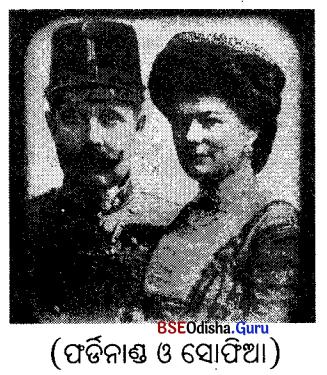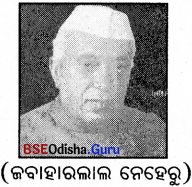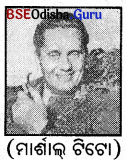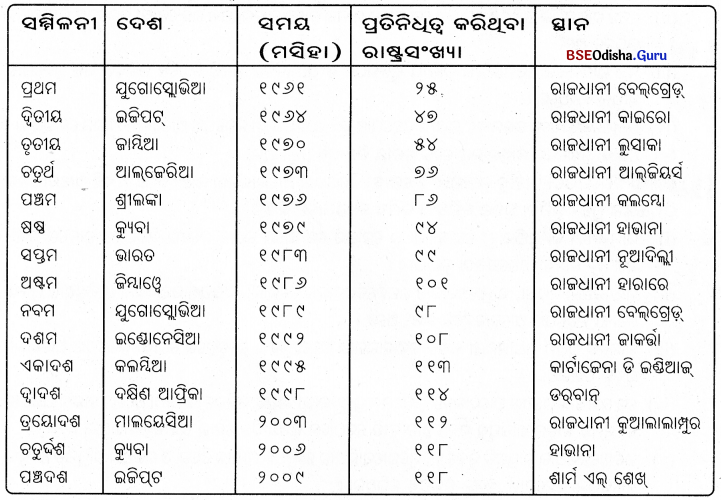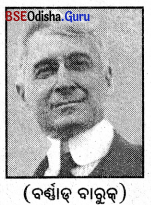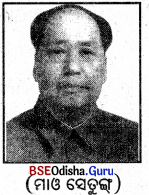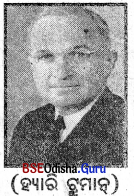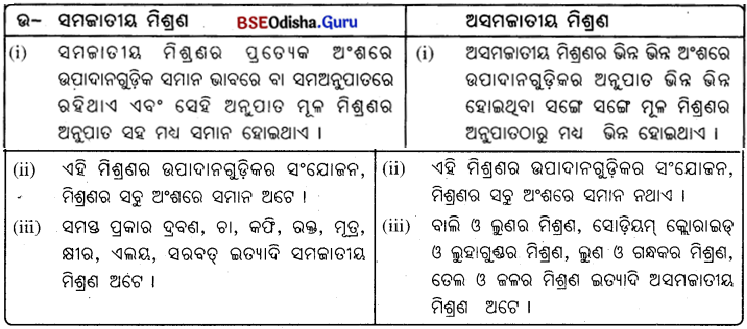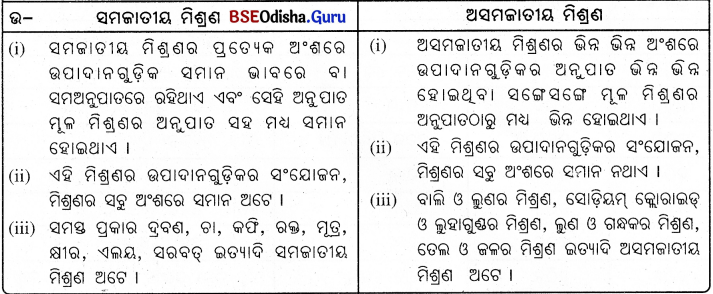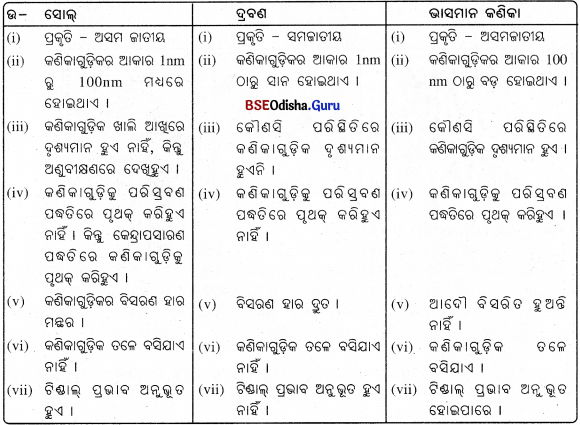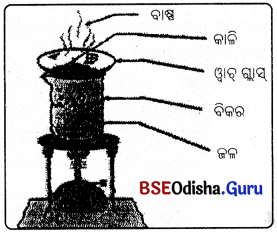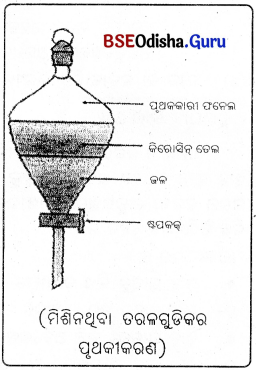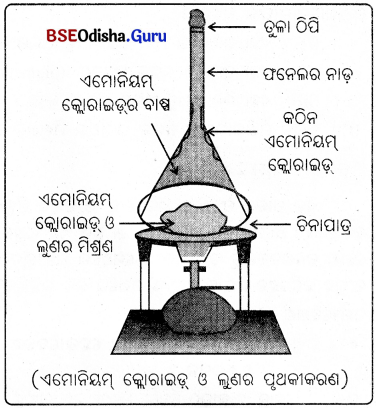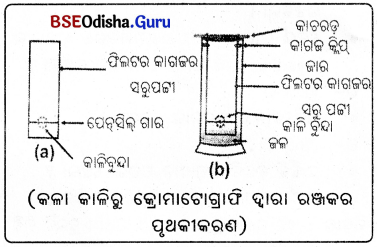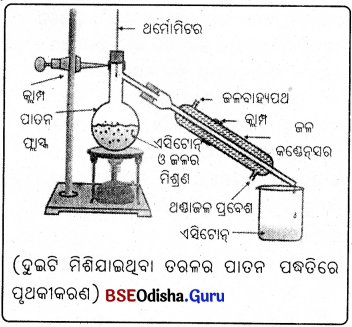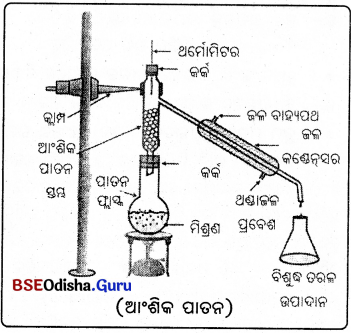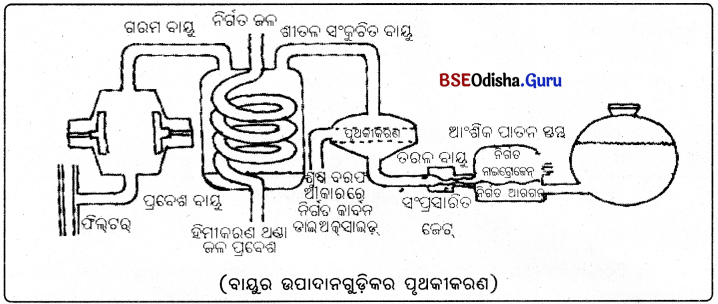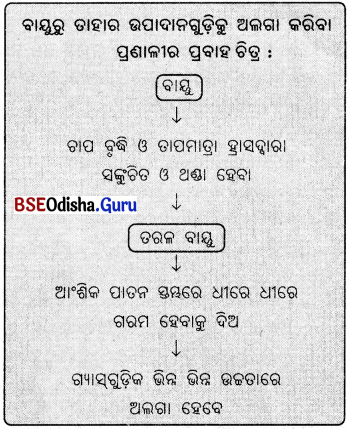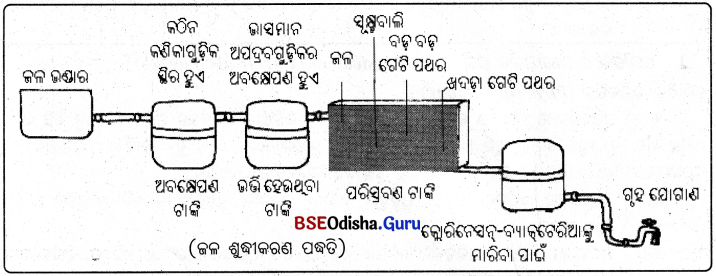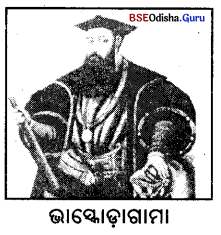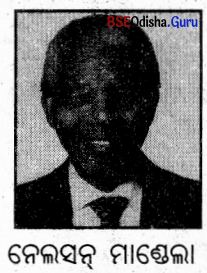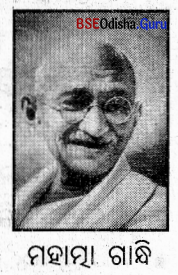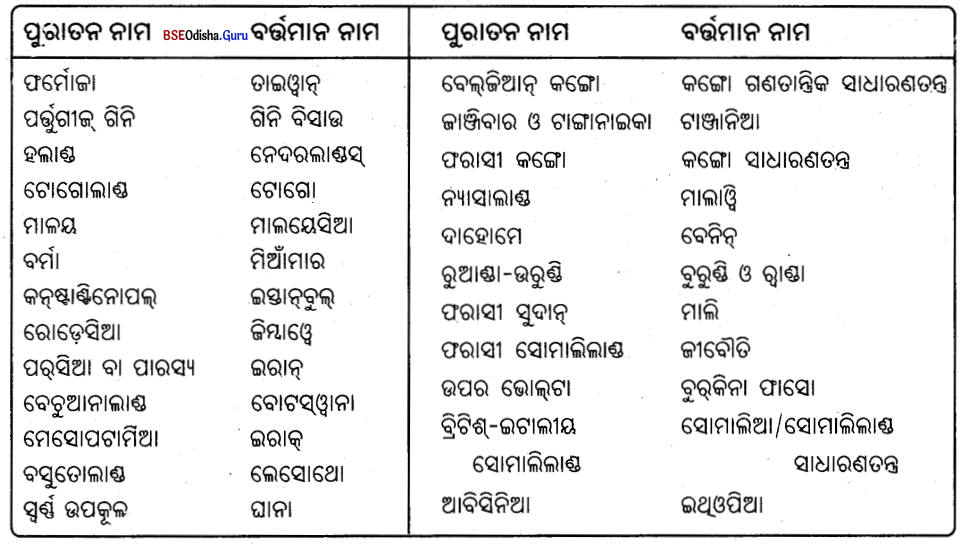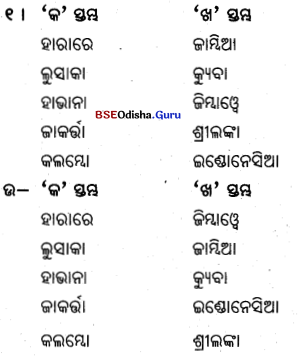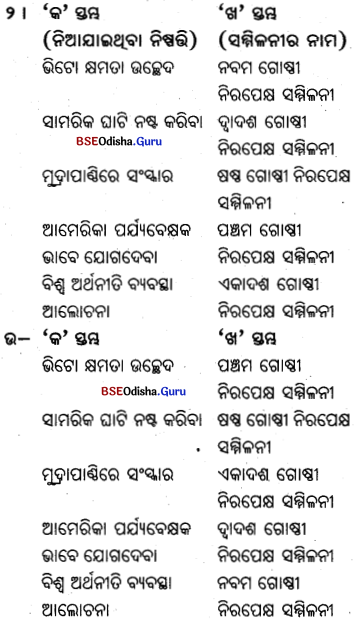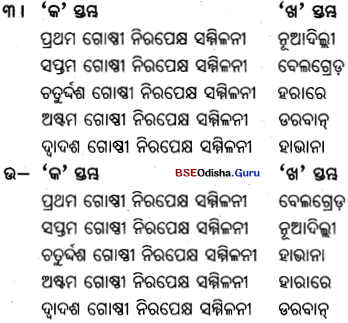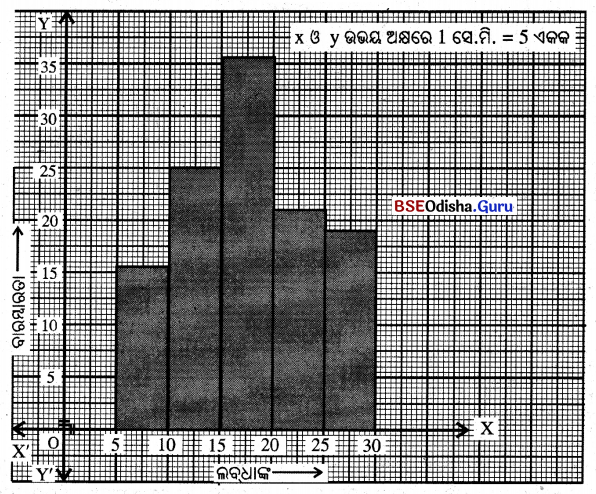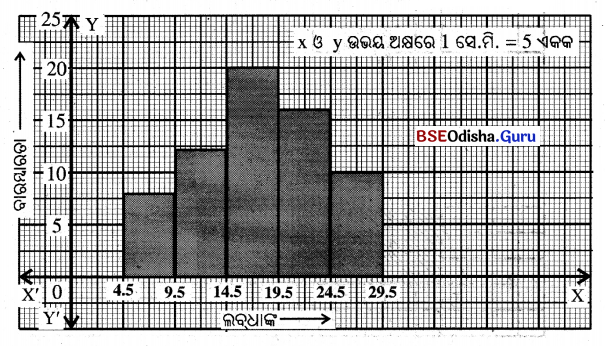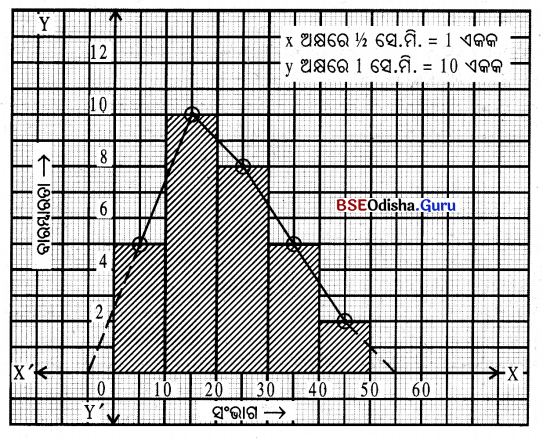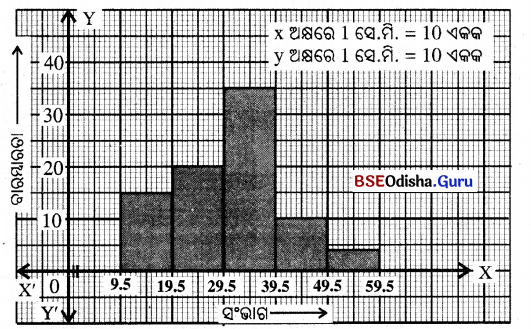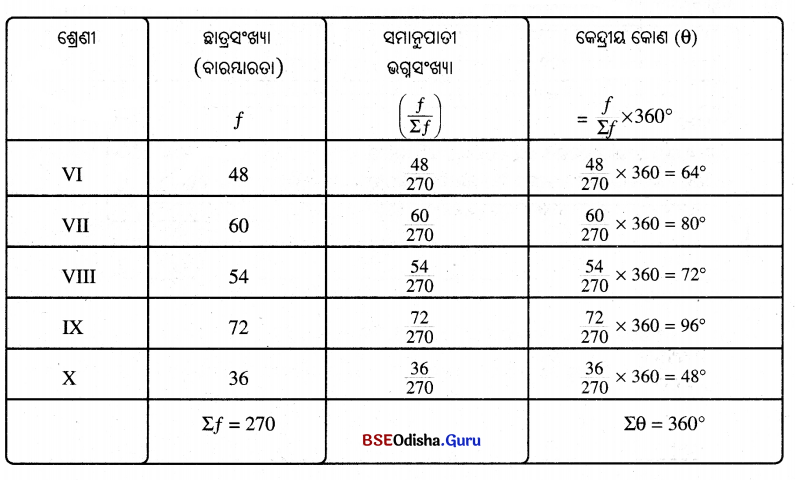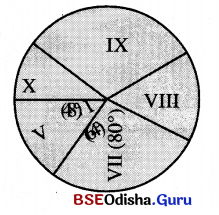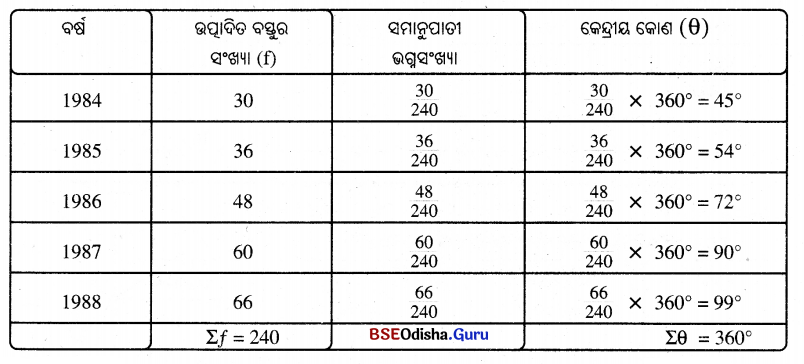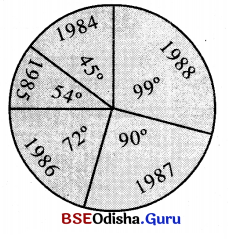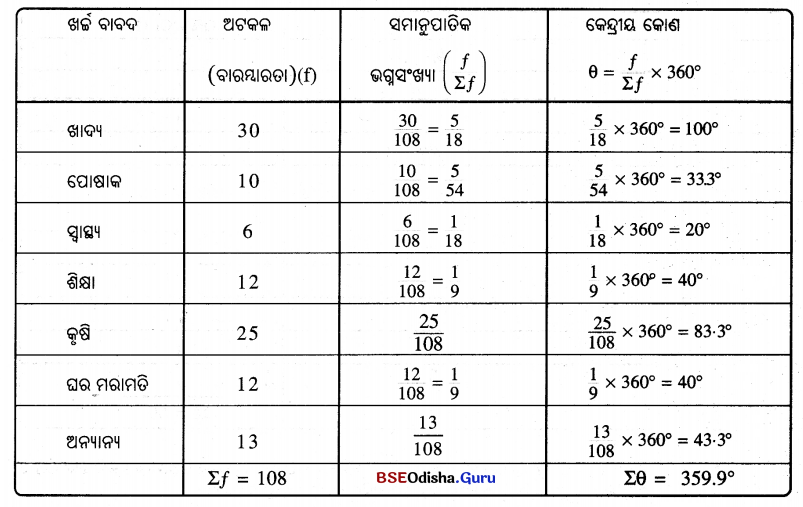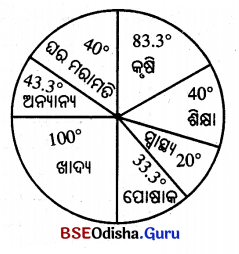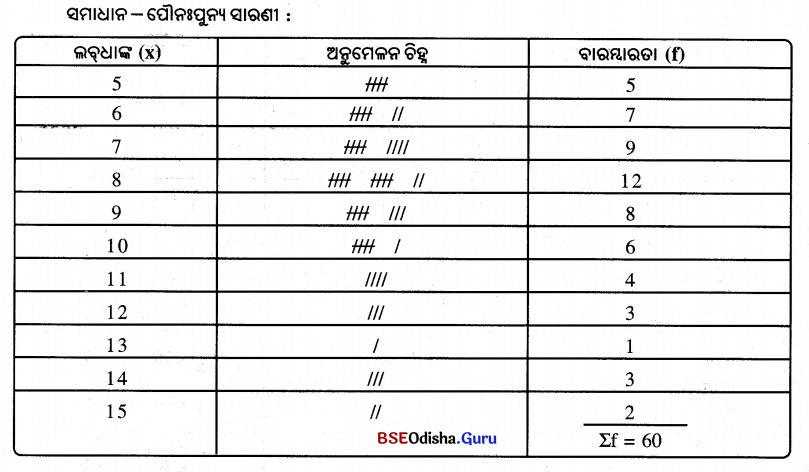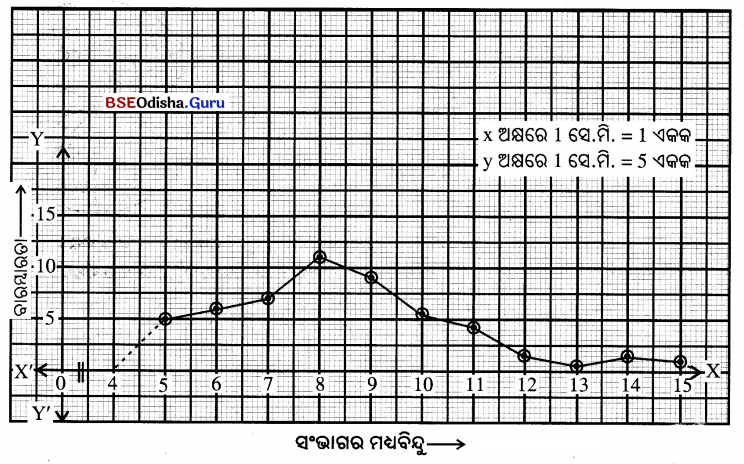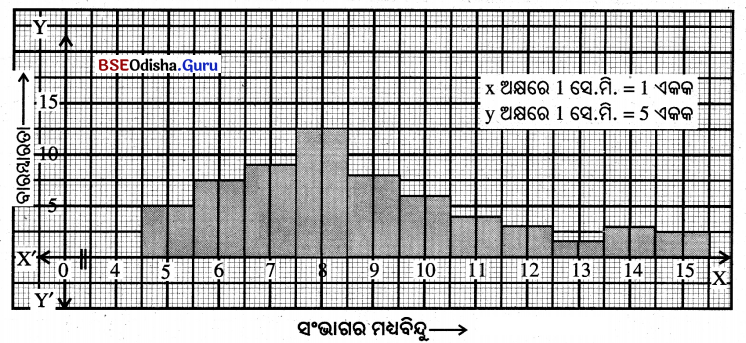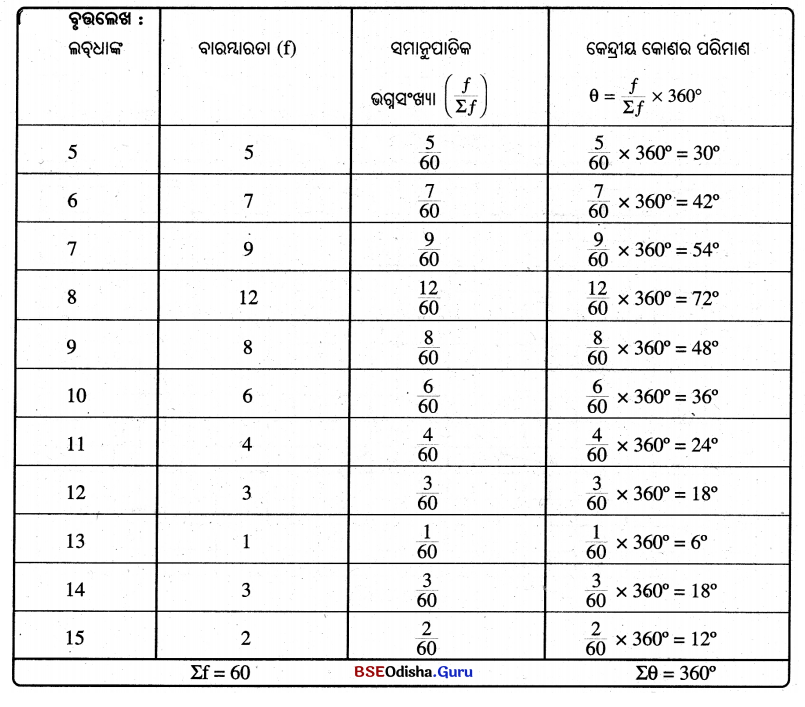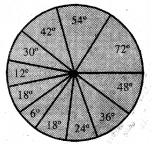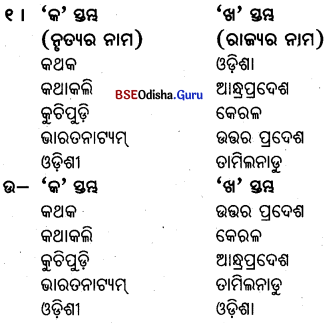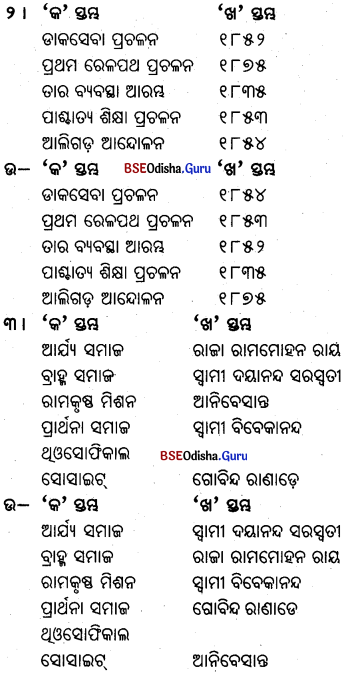Odisha State Board BSE Odisha 9th Class History Important Questions Chapter 8 ଶୀତଳ ଯୁଦ୍ଧ: କାରଣ ଓ ଫଳାଫଳ Important Questions and Answers.
BSE Odisha Class 9 History Important Questions Chapter 8 ଶୀତଳ ଯୁଦ୍ଧ: କାରଣ ଓ ଫଳାଫଳ
ଦୀର୍ଘ ଉତ୍ତରମୂଳକ ପ୍ରଶ୍ନୋତ୍ତର
୧। ଶୀତଳ ଯୁଦ୍ଧର ଫଳାଫଳଗୁଡ଼ିକ କ’ଣ ଥିଲା ?
Answer:
- ଶୀତଳ ଯୁଦ୍ଧ ଫଳରେ ବିଶ୍ଵ ରାଜନୀତି କ୍ଷେତ୍ରରେ ପ୍ରଭାବ ବିସ୍ତାର ପାଇଁ ଦୁଇ ବୃହତ୍ ଶକ୍ତି ଯୁକ୍ତରାଷ୍ଟ୍ର ଆମେରିକା ଓ ସୋଭିଏତ୍ ରୁଷ୍ ମଧ୍ୟରେ ପ୍ରତିଦ୍ବନ୍ଦିତା ଆରମ୍ଭ ହୋଇଥିଲା ।
- ପୂର୍ବ ଇଉରୋପୀୟ ରାଷ୍ଟ୍ର ପୋଲାଣ୍ଡ, ହଙ୍ଗେରୀ, ରୁ ମାନି ଆ, ବୁଲ୍ ଗେରିଆ, ଆଲ୍ବାନିଆ ପ୍ରଭୃତି ରାଷ୍ଟ୍ରରେ ସାମ୍ୟବାଦୀ ସରକାର ଗଠିତ ହୋଇଥିବାରୁ ସୋଭିଏତ୍ ରୁଷ୍ ସେସବୁ ରାଷ୍ଟ୍ରଗୁଡ଼ିକୁ ଆର୍ଥିକ ସାହାଯ୍ୟ ଯୋଗାଇଦେଲା । ଚୀନ୍ରେ ୧୯୪୯ ମସିହାରେ ରୁଷ୍ ସହାୟତାରେ ସାମ୍ୟବାଦୀ ଶାସନ ପ୍ରତିଷ୍ଠା ହୋଇଥିଲା ।
- ଅପରପକ୍ଷରେ ଯୁକ୍ତରାଷ୍ଟ୍ର ଆମେରିକା ସାମ୍ୟବାଦର ପ୍ରଭାବକୁ ପ୍ରତିହତ କରିବାକୁ ବିଭିନ୍ନ ପଦକ୍ଷେପ ନେଲା ଏବଂ ଟମାନ ନୀତି ଓ ମାର୍ଶାଲ୍ ଯୋଜନା ପ୍ରଣୟନ କରି ପଶ୍ଚିମ ଇଉରୋପ ଓ ମଧ୍ୟପ୍ରାଚ୍ୟକୁ ସାମ୍ୟବାଦର ପ୍ରଭାବରୁ ମୁକ୍ତ ରଖିବାପାଇଁ ଚେଷ୍ଟା କରିଥିଲା ।
- ଶୀତଳ ଯୁଦ୍ଧ ଯୋଗୁଁ ଯୁକ୍ତରାଷ୍ଟ୍ର ଆମେରିକା ଓ ସୋଭିଏତ୍ ରୁଷ୍ ମଧ୍ୟରେ ସମ୍ପର୍କ ତିକ୍ତ ହୋଇଥିଲା ।
- ଶୀତଳ ଯୁଦ୍ଧର ତୀବ୍ରତା ବୃଦ୍ଧି ପାଇବାରୁ ଜର୍ମାନୀ, କ୍ୟୁବା ଓ କୋରିଆ ଆଦି ଦେଶରେ ସଂଘର୍ଷ ଉପୁଜିଲା ।
![]()
କ୍ଷୁଦ୍ର ଉତ୍ତରମୂଳକ ପ୍ରଶ୍ନୋତ୍ତର
୧। ଶୀତଳ ଯୁଦ୍ଧ କ’ଣ ? କେଉଁ ଦୁଇଟି ଦେଶ ଏହାର ନେତୃତ୍ବ ନେଇଥିଲେ ?
Answer:
- ଶୀତଳ ଯୁଦ୍ଧ ଏକ ପ୍ରତ୍ୟକ୍ଷ ବା ସିଧାସଳଖ ଯୁଦ୍ଧ ନୁହେଁ । ଏହା ଆଦର୍ଶଗତ ବିଭେଦ, ଅପପ୍ରଚାର ଏବଂ କୂଟନୀତି ସ୍ତରୀୟ ପ୍ରତିଦ୍ବନ୍ଦିତାକୁ ବୁଝାଏ ।
- ପୃଥିବୀର ଦୁଇ ବୃହତ୍ ଶକ୍ତି ଯୁକ୍ତରାଷ୍ଟ୍ର ଆମେରିକା ଓ ସୋଭିଏତ୍ ରୁଷ୍ ଏହାର – ନେତୃତ୍ୱ ନେଇଥିଲେ ।
୨। ସାମ୍ୟବାଦର ପ୍ରସାର ଓ ପ୍ରଭାବକୁ ପ୍ରତିହତ କରିବାପାଇଁ ଯୁକ୍ତରାଷ୍ଟ୍ର ଆମେରିକା କ’ଣ କରିଥିଲା ?
Answer:
- ପଶ୍ଚିମ’ ଇଉରୋପ ଓ ମଧ୍ୟପ୍ରାଚ୍ୟରେ ସାମ୍ୟବାଦର ପ୍ରସାର ଓ ପ୍ରଭାବକୁ ପ୍ରତିହତ କରିବାପାଇଁ ଯୁକ୍ତରାଷ୍ଟ୍ର ଆମେରିକା ଟୁମାନ୍ ନୀତି ଓ ମାର୍ଶାଲ୍ ଯୋଜନା ପ୍ରବର୍ତ୍ତନ କରିଥିଲା ।
- ଯୁକ୍ତରାଷ୍ଟ୍ର ଆମେରିକା ଏସବୁ ଦେଶଗୁଡ଼ିକୁ ଆର୍ଥିକ ସହାୟତା ପ୍ରଦାନ କରି ଅର୍ଥନୈତିକ ବିପର୍ଯ୍ୟୟ ଓ ସାମ୍ୟବାଦର ପ୍ରଭାବରୁ ମୁକ୍ତ କରିଥିଲା ।
୩। କେଉଁ କାରଣରୁ ଶୀତଳ ଯୁଦ୍ଧ ସୃଷ୍ଟି ହୋଇଥିଲା ? କାହାକୁ ଶୀତଳ ଯୁଦ୍ଧ କୁହାଯାଏ ?
Answer:
- ବିଶ୍ବ ରାଜନୀତି କ୍ଷେତ୍ରରେ ପ୍ରଭାବ ବିସ୍ତାର ନିମନ୍ତେ ଦୁଇ ମହାଶକ୍ତି ଯୁକ୍ତରାଷ୍ଟ୍ର ଆମେରିକା ଓ ସୋଭିଏତ୍ ରୁଷ୍ ମଧ୍ୟରେ ପ୍ରତିଦ୍ବନ୍ଦିତା ଆରମ୍ଭ ହେବାରୁ ପରସ୍ପର ମଧ୍ୟରେ ଶତ୍ରୁତା ବୃଦ୍ଧି ପାଇଲା। ନିଜ ନି ଜର ଅନୁ ଗତ ରାଷ୍ଟ୍ରଗୁଡ଼ିକୁ ସେମାନେ ଆର୍ଥିକ ଓ ସାମରିକ
ସାହାଯ୍ୟ ଯୋଗାଇଦେଲେ । - ପ ର ସ୍ପର ମଧ୍ୟରେ ମଧ୍ୟରେ କୁ ୱାର ଟନା ଓ ବିରୋଧାତ୍ମକ ପ୍ରଚାର ଫଳରେ ବିଶ୍ଵ ରାଜନୀତି କ୍ଷେତ୍ରରେ ଏକ ଅଶାନ୍ତ ତଥା ସରଗରମ ପରିସ୍ଥିତି ସୃଷ୍ଟି ହେଲା, ଯାହାକି ଶୀତଳ ଯୁଦ୍ଧ ଭାବେ ପରିଚିତ ।
୪। ‘ମାଓ ସେ ତୁଙ୍ଗ କିଏ ? ସେ କ’ଣ କରିଥିଲେ ?
Answer:
- ମାଓ ସେ ତୁଙ୍ଗ ଚୀନ୍ର ସାମ୍ୟବାଦୀ ଦଳର ଜଣେ ନେତା ଥିଲେ ।
- ୧୯୪୯ ମସିହା ଅକ୍ଟୋବର ମାସରେ ଗଣବିପ୍ଳବ ମାଧ୍ୟମରେ ସେ ଚୀନ୍ ରେ ସାମ୍ୟବାଦୀ ସରକାର ଗଠନ କରିଥିଲେ ।
![]()
୫। କେଉଁ ରାଷ୍ଟ୍ର କେବେ ଓ କାହିଁକି ମାର୍ଶାଲ୍ ଯୋଜନା ପ୍ରବର୍ତ୍ତନ କରିଥିଲା ?
Answer:
ଦ୍ବିତୀୟ ବିଶ୍ୱଯୁଦ୍ଧରେ ବିଧ୍ବସ୍ତ ଇଉରୋପୀୟ ରାଷ୍ଟ୍ରଗୁଡ଼ିକର ସାମାଜିକ ତଥା ଅର୍ଥନୈତିକ ପରିସ୍ଥିତିରେ ଉନ୍ନତି ଆଣିବା ଏବଂ ସେହି ଦେଶଗୁଡ଼ିକରେ ସାମ୍ୟବାଦର ପ୍ରସାରକୁ ପ୍ରତିହତ କରିବା ଉଦ୍ଦେଶ୍ୟରେ ଯୁକ୍ତରାଷ୍ଟ୍ର ଆମେରିକା ୧୯୪୭ ମସିହା ଜୁନ୍ ୫ ତାରିଖରେ ମାର୍ଶାଲ୍ ଯୋଜନା ପ୍ରବର୍ତ୍ତନ କରିଥିଲା ।
A. ଗୋଟିଏ ବାକ୍ୟରେ ଉତ୍ତର ଲେଖ ।
୧। କେବେ କେଉଁ ଦେଶ ସହୟତାରେ ଚୀନ୍ ଦେଶରେ ସାମ୍ୟବାଦୀ ସରକାର ଗଠିତ ହୋଇଥିଲା ?
Answer:
୧୯୪୯ ମସିହାରେ ରୁଷ୍ ଦେଶ ସହାୟତାରେ ଚୀନ୍ ଦେଶରେ ସାମ୍ୟବାଦୀ ସରକାର ଗଠିତ ହୋଇଥିଲା ।
୨। କେବେ ସୋଭିଏତ୍ ରୁଷ୍ ତୁର୍କୀ ସହିତ ତା’ର ପୁରାତନ ବନ୍ଧୁତ୍ୱ ଚୁକ୍ତି ନବୀକରଣ ନିମନ୍ତେ ମନା କରିଦେଇଥିଲା ?
Answer:
୧୯୪୫ ମସିହାରେ ସୋଭିଏତ୍ ରୁଷ୍ ତୁର୍କୀ ସହିତ ତା’ର ପୁରାତନ ବନ୍ଧୁତ୍ୱ ଚୁକ୍ତି ନବୀକରଣ ନିମନ୍ତେ ମନା କରିଦେଇଥୁଲା ।
୩। ଟୁମାନ୍ ଟୁମାନ୍ ନୀତି କେବେ ଉପସ୍ଥାପିତ କରାଯାଇଥିଲା
Answer:
୧୯୪୭ ମସିହା ମାର୍ଚ୍ଚ ୧୨ ତାରିଖ ଦିନ ଟୁମାନ୍ ନୀତି ଉପସ୍ଥାପିତ କରାଯାଇଥିଲା ।
୪। କେଉଁ ମସିହା ସୁଦ୍ଧା ଗ୍ରୀସ୍ ଓ ତୁର୍କୀର ପରିସ୍ଥିତି ସମ୍ପୂର୍ଣ୍ଣ ବଦଳିଯାଇଥିଲା ?
Answer:
୧୯୫୦ ମସିହା ସୁଦ୍ଧା ଗ୍ରୀସ୍ ଓ ତୁର୍କୀର ପରିସ୍ଥିତି ସମ୍ପୂର୍ଣ୍ଣ ବଦଳିଯାଇଥିଲା ।
୫। କେଉଁ ରାଷ୍ଟ୍ର କେବେ ମାର୍ଶାଲ୍ ଯୋଜନା ପ୍ରବର୍ତ୍ତନ କରିଥିଲେ ?
Answer:
ଯୁକ୍ତରାଷ୍ଟ୍ର ଆମେରିକା ୧୯୪୭ ମସିହା ଜୁନ୍ ୫ ତାରିଖରେ ମାର୍ଶାଲ୍ ଯୋଜନା ପ୍ରବର୍ତ୍ତନ କରିଥିଲା ।
୬। ମାର୍ଶାଲ୍ ଯୋଜନାକୁ କେଉଁ ଦେଶ ତୀବ୍ର ନିନ୍ଦା କରିଥିଲା ?
Answer:
ମାର୍ଶାଲ୍ ଯୋଜନାକୁ ସୋଭିଏତ୍ ରୁଷ୍ ତୀବ୍ର ନିନ୍ଦା କରିଥିଲେ ।
![]()
B. ଗୋଟିଏ ପଦରେ ଉତ୍ତର ଲେଖ ।
୧। ମାର୍ଶାଲ୍ ଯୋଜନା କେବେ ପ୍ରବର୍ତ୍ତନ କରାଯାଇଥିଲା ?
Answer:
୧୯୪୭ ଜୁନ୍ ୫
୨। ଟୁମାନ୍ ନୀତି ଆମେରିକାରେ କେବେ ପ୍ରବର୍ତ୍ତନ କରାଯାଇଥିଲା ?
Answer:
୧୯୪୭ ମାର୍ଚ୍ଚ ୧୨
୩। ମାର୍ଶାଲ୍ ଯୋଜନା କେଉଁ ନୀତିର ଏକ ସମ୍ପ୍ରସାରଣ ଥିଲା ?
Answer:
ଟୁମାନ୍ ନୀତି
୪। କେଉଁ ଦୁଇ ଦେଶ ମଧ୍ୟରେ ମାର୍ଶାଲ୍ ଯୋଜନା ତୀବ୍ରତା ସୃଷ୍ଟି କରିଥିଲା ?
Answer:
ରୁଷିଆ ଓ ଆମେରିକା
୫। ଗରିଲା ଯୁଦ୍ଧ କେଉଁ ଦେଶରେ ଲାଗି ରହିଥିଲା ?
Answer:
ଗ୍ରୀସ୍
୬। ପୃଥିବୀର କେଉଁ ଦୁଇ ମହାଶକ୍ତି ମଧ୍ୟରେ ଆଦର୍ଶଗତ ପାର୍ଥକ୍ୟ ଥିଲା ?
Answer:
ରୁଷ୍ ଓ ଆମେରିକା
![]()
୭ । ଆଲ୍ବାନିଆ ଓ ବୁଲଗେରିଆରେ କେଉଁ ପ୍ରକାର ଶାସନ ପ୍ରତିଷ୍ଠିତ ହୋଇଥିଲା ?
Answer:
ସାମ୍ୟବାଦୀ
୮। ରଣକ୍ଷେତ୍ର ରେ ସିଧାସଳଖ ଯୁଦ୍ଧ ନକରି ଅନୁଗତ ରାଷ୍ଟ୍ରମାନଙ୍କୁ ଆର୍ଥିକ ଓ ସାମରିକ ସାହାଯ୍ୟ ଦେଇ ପରୋକ୍ଷ ଭାବରେ ଯୁଦ୍ଧ କରିବାକୁ କେଉଁ ଯୁଦ୍ଧ କୁହାଯାଏ ?
Answer:
ଶୀତଳ ଯୁଦ୍ଧ
୯ । ଗ୍ରୀସ୍ରେ ହୋଇଥିବା ଗୃହଯୁଦ୍ଧରେ କେତେ ପରିମାଣରେ ଗରିଲା ଭାଗ ନେଇଥିଲେ ?
Answer:
୧୩,୦୦୦
୧୦ । ଯୁକ୍ତରାଷ୍ଟ୍ର ଆମେରିକାର କଂଗ୍ରେସ ଜୁନ୍ ୧୯୪୮ ମସିହା ସୁଦ୍ଧା ଗ୍ରୀସ୍ ଓ ତୁର୍କୀକୁ କେତେ ପରିମାଣରେ ଆର୍ଥିକ ସାହାଯ୍ୟ ପ୍ରଦାନ କରିଥିଲା ?
Answer:
୪୦୦ ନିୟୁତ ଡଲାର
୧୧ । ‘ମାଓ ସେ ତୁଙ୍ଗୁ’ କେଉଁ ଦେଶର ଲୋକ ଥିଲେ ?
Answer:
ଚୀନ୍
୧୨ । କେଉଁ ଦେଶରେ ୧୯୧୭ ମସିହାରେ କୃଷକ ଓ ଶ୍ରମିକ ଆନ୍ଦୋଳନ ସଂଘଟିତ ହୋଇଥିଲା ?
Answer:
ରୁଷ୍
୧୩। କେଉଁ ମସିହାରେ ଚୀନ୍ ଦେଶରେ ମାଓ-ସେ-ତୁଙ୍ଗଙ୍କ ନେତୃତ୍ବରେ ସାମ୍ୟବାଦୀ ସରକାର ଗଠିତ ହୋଇଥିଲା ? ୧୪।‘ଶୀତଳ ଯୁଦ୍ଧ’ ଶବ୍ଦଟି ପ୍ରଥମ ଥର ପାଇଁ କିଏ ବ୍ୟବହାର କରିଥିଲେ ?
Answer:
୧୯୪୯
୧୪ । ‘ଶୀତଳ ଯୁଦ୍ଧ’ ଶବ୍ଦଟି ପ୍ରଥମ ଥର ପାଇଁ କିଏ ବ୍ୟବହାର କରିଥଲେ ?
Answer:
ବର୍ଣ୍ଣାଡ୍ ବାରୁକ୍
![]()
୧୫। ଗ୍ରୀସ୍ କେବେ ସଂଯୁକ୍ତ ରାଷ୍ଟ୍ରସଂଘର ନିରାପତ୍ତା ପରିଷଦରେ ତାହାର ପଡ଼ୋଶୀ ରାଷ୍ଟ୍ର ମାନ ଙ୍କ ବିରୋଧରେ ଅଭିଯୋଗ କରିଥିଲା ?
Answer:
୧୯୪୬ ଡିସେମ୍ବର ।
C. ଶୂନ୍ୟସ୍ଥାନ ପୂରଣ କର ।
୧। ‘ଶୀତଳ ଯୁଦ୍ଧ’ ଶବ୍ଦଟିକୁ ପ୍ରଥମେ ଆମେରି କୀୟ ରାଜନୀତିଞ ______________ ୧୬ ଏପ୍ରିଲ୍ ୧୯୪୭ରେ ବ୍ୟବହାର କରିଥିଲେ ।
Answer:
ବର୍ଣ୍ଣାଡ୍ ବାରୁକ୍
୨। ଆମେରିକା _____________ ରେ ବିଶ୍ଵାସ କରୁଥିଲାବେଳେ ସୋଭିଏତ୍ ରୁଷ୍ ______________ ରେ ବିଶ୍ବାସ କରୁଥିଲା ।
Answer:
ଗଣତନ୍ତ୍ର, ସାମ୍ୟବାଦ
୩। ଚୀନ୍ରେ _____________ ଙ୍କ ନେତ୍ଠତୄରେ ସାମ୍ୟବାଦୀ ସରକାର ଗଠିତ ହୋଇଥିଲା ।
Answer:
ମାଓ ସେ ତୁଙ୍ଗ
୪। _______________ ମାର୍ଶାଲ୍ ଯୋଜନା ପ୍ରବର୍ତ୍ତନ କରିଥିଲା
Answer:
ଯୁକ୍ତରାଷ୍ଟ୍ର ଆମେରି କା
![]()
୫। ଯୁକ୍ତରାଷ୍ଟ୍ର ଆମେରିକାର କଂଗ୍ରେସ ୧୯୪୮ ମସିହା ସୁଦ୍ଧା ଗ୍ରୀସ୍ ଓ ତୁର୍କୀକୁ ଆର୍ଥିକ ତଥା ସାମରିକ ସାହାଯ୍ୟ ___________ ନିୟତ ଡଲାର ମଞ୍ଚର କରିଥିଲା ।
Answer:
୪୦୦
୬ । ମାଓ ସେ ତୁଙ୍ଗ ଚୀନ୍ ଦେଶର ______________ ପ୍ରଦେଶରେ ଜନ୍ମଗ୍ରହଣ କରିଥିଲେ ।
Answer:
ହୁନାନ୍
୭ । ୱାଲଟର୍ ଲିପ୍ମାନ ବୃତ୍ତିରେ ଜଣେ ______________ ଥିଲେ ।
Answer:
ସାମ୍ବାଦିକ
୮ । ସାମ୍ୟବାଦୀ ସରକାରରେ _______________ ଦେଶ ବିଶାସ କରେ ।
Answer:
ସୋଭିଏତ୍ ରୁଷ୍
୯। ଯୁକ୍ତରାଷ୍ଟ୍ର ଆମେରିକା ___________ ବାଦରେ ବିଶାସ କରୁଥିଲା ।
Answer:
ପୁଞ୍ଜି
୧୦ । ଜର୍ମାନୀ ବିଭାଜନ ପରେ _____________ ଜର୍ମାନୀରେ ସାମ୍ୟବାଦୀ ସରକାର ପ୍ରତିଷ୍ଠିତ ହୋଇଥଲା ।
Answer:
ପୂର୍ବ
୧୧ । ଗରିଲା ଯୁଦ୍ଧ ______________ ଦେଶରେ ଦେଖାଯାଇଥିଲା ।
Answer:
ଗ୍ରୀସ୍
![]()
୧୨ । ମାଓ-ସେ- ତୁଙ୍ଗ ____________ ଦେଶର ଜଶେ ସାମ୍ୟବାଦୀ ନେତା ଥିଲେ ।
Answer:
ଚୀନ୍
୧୩ । ____________ ମସିହାରେ ଚୀରେ ସାମ୍ୟବାଦୀ ସରକାର ଗଠନ କରାଯାଇଥିଲା ।
Answer:
୧୯୪୯
୧୪ । ରୁ ଷ୍ ଦେଶରେ ବିପ୍ଳବ _____________ ମସିହାରେ ଦେଖାଦେଇଥିଲା ।
Answer:
୧୯୧୭
୧୫ । ଶୀତଳ ଯୁଦ୍ଧ ଯୋଗୁଁ ଆମେରିକା ଓ _____________ ଦେଶ ମଧ୍ୟରେ ତିକ୍ତତା ଦେଖାଦେଇଥିଲା ।
Answer:
ରୁଷ୍
୧୬ । ମାର୍ଶାଲ ଯୋଜନାକ ____________ ଦେଶ ତୀବ୍ର ନିନ୍ଦା କରୁଥିଲା ।
Answer:
ରୁଷ୍ ।
D. ଠିକ୍ ଉକ୍ତି ପାଇଁ (✓) ଓ ଭୁଲ ଉକ୍ତି ପାଇଁ (x) ଲେଖ ।
୧। କେତେକ ଐତିହାସିକ ବିଶ୍ଵାସ କରନ୍ତି ଶୀତଳ ଯୁଦ୍ଧ ୧୯୧୮ ମସିହାରେ ଆରମ୍ଭ ହୋଇଥିଲା ।
Answer:
x
୨ । ଯୁକ୍ତରାଷ୍ଟ୍ର ଆମେରିକା ପୁଞ୍ଜିବାଦରେ ବିଶ୍ୱାସ କରୁଥିଲା ।
Answer:
✓
୩। ସାମ୍ୟବାଦରେ ବିଶ୍ବାସ କରୁଥିବା ଦେଶ ଥିଲା ସୋଭିଏତ୍ ରୁଷ୍ ।
Answer:
✓
୪। ଚୀନ୍ରେ ଦେଖାଯାଇଥିବା ଗଣବିପ୍ଲବରେ ଆମେରିକା ସାହାଯ୍ୟ କରିଥିଲା ।
Answer:
x
![]()
୫ । ମାଓ-ସେ-ତୁଙ୍ଗଙ୍କ ନେତୃତ୍ବରେ ଭିଏତ୍ନାମ୍ରେ ନୂତନ ସରକାର ଗଠନ କରାଯାଇଥିଲା ।
Answer:
x
୬। ଜର୍ମାନୀର ବିଭାଜନ ପରେ ପୂର୍ବ ଜର୍ମାନୀରେ ସାମ୍ୟବାଦୀ ସରକାର ପ୍ରତିଷ୍ଠିତ ହେଲା ।
Answer:
✓
୭ । ଟ୍ରମାନ୍ ନୀତି ଆମେରିକା କଂଗ୍ରେସରେ ୧୯୪୭ ମସିହା ମାର୍ଚ୍ଚ ୧୨ ତାରିଖରେ ଘୋଷଣା କରାଯାଇଥିଲା ।
Answer:
✓
୮ । ଟ୍ରମାନ୍ ଆମେରିକାର ଜଣେ ଅର୍ଥନୀତିଜ୍ଞ ଥିଲେ ।
Answer:
x
୯। ଗରିଲା ଯୁଦ୍ଧ ଗ୍ରୀସ୍ ଦେଶରେ ଦେଖାଯାଇଥିଲା ।
Answer:
✓
୧୦ । ମାର୍ଶାଲ୍ ଯୋଜନା ୧୯୪୬ ମସିହା ଜୁନ୍ ୫ ତାରିଖରେ ଘୋଷଣା କରାଯାଇଥିଲା ।
Answer:
x
![]()
E. ‘କ’ ସ୍ତମ୍ଭର ଶବ୍ଦକୁ ‘ଖ’ ସ୍ତମ୍ଭର ଶବ୍ଦ ସହ ମିଳନ କରି ଲେଖ ।
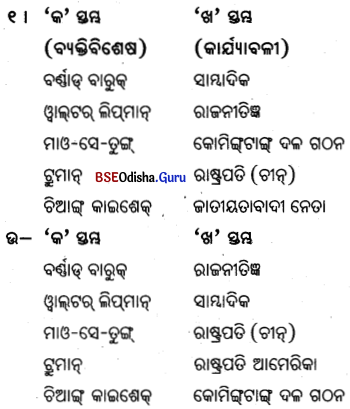
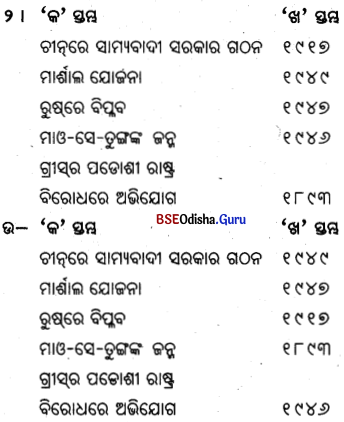
![]()
F. ରେଖାଙ୍କିତ ପଦକୁ ପରିବର୍ତ୍ତନ କରି ଭ୍ରମ ସଂଶୋଧନ କର ।
୧। ବର୍ଣ୍ଣାଡ ବାରୁକ୍ ସୋଭିଏତ ରୁଷର ରାଜନୀତିଜ୍ଞ ଥିଲେ ।
Answer:
ଯୁକ୍ତରାଷ୍ଟ୍ର ଆମେରିକା
୨ । ସୋଭିଏତ୍ ରୁଷ୍ ଗଣତନ୍ତ୍ର ଆଦର୍ଶରେ ବିଶ୍ବାସ କରୁଥିଲା ।
Answer:
ସାମ୍ୟବାଦ
୩। ଚୀନୁ ମାର୍ଶାଲ ଯୋଜନାର ତୀବ୍ର ନିନ୍ଦା କରୁଥିଲା ।
Answer:
ସୋଭିଏତ୍ ରୁଷ
୪। ଶୀତଳ ଯୁଦ୍ଧ ଶବ୍ଦଟି ପ୍ରଥମ ବିଶ୍ଵଯୁଦ୍ଧ ପରେ ବ୍ୟବହାର କରାଯାଇଥିଲା ।
Answer:
ଦ୍ୱିତୀୟ ବିଶ୍ୱଯୁଦ୍ଧ
୫। ଫ୍ରାନ୍ ସରେ ୧୯୧୭ ମସିହାରେ କୃଷକ ଓ ଶ୍ରମିକମାନେ ଆନ୍ଦୋଳନ କରିଥିଲେ ।
Answer:
ରୁଷିଆ
୬। ୧୯୪୮ ମସିହାରେ ଚୀନ୍ରେ ସାମ୍ୟବାଦୀ ସରକାର ଗଠିତ ହୋଇଥିଲା ?
Answer:
୧୯୪୯
୭। ମାଓ-ସେ-ତୁଙ୍ଗ ୧୮୯୨ ମସିହାରେ ଜନ୍ମ ଗ୍ରହଣ କରିଥିଲେ ।
Answer:
୧୮୯୩
![]()
୮ । ଯୁକ୍ତରାଷ୍ଟ୍ର ଆମେରିକା କଂଗ୍ରେସ ଗ୍ରୀସ୍ ଓ ତୁର୍କୀକୁ ୬୦୦ ନିୟୁତ ଡଲାର ମଞ୍ଜୁର କରିଥିଲା ।
Answer:
୪୦୦
୯। ମାର୍ଶାଲ ଯୋଜନା ଟୁମାନ୍ ନୀତିର ବିରୋଧ କରୁଥିଲା ।
Answer:
ସମ୍ପ୍ରସାରଣ
୧୦। ଟୁମାନ୍ ଋଷିଆର ରାଷ୍ଟ୍ରପତି ଥିଲେ ।
Answer:
ଯୁକ୍ତରାଷ୍ଟ୍ର ଆମେରିକା
G. ଚାରୋଟି ସମ୍ଭାବ୍ୟ ବିକଳ୍ପ ମଧ୍ୟରୁ ସଠିକ୍ ଉତ୍ତରଟି ବାଛି ଲେଖ ।
1. ସୋଭିଏତ୍ ରୁଷ୍ ନିମ୍ନୋକ୍ତ କେଉଁ ଆଦର୍ଶରେ ବିଶ୍ଵାସ କରୁଥିଲା ?
(A) ଗଣତନ୍ତ୍ର
(B) ରାଜତନ୍ତ୍ର
(C) ସାମ୍ୟବାଦୀ
(D) ଲୋକତନ୍ତ୍ର
Answer:
(C) ସାମ୍ୟବାଦୀ
2. ଆମେରିକା ନିମ୍ନୋକ୍ତ କେଉଁ ଆଦର୍ଶରେ ବିଶ୍ଵାସ କରୁଥୁଲା ?
(A) ଗଣତନ୍ତ୍ର
(B) ଲୋକତନ୍ତ୍ର
(c) ରାଜତନ୍ତ୍ର
(D) ପ୍ରଜାତନ୍ତ୍ର
Answer:
(A) ଗଣତନ୍ତ୍ର
3. ୧୯୪୯ ମସିହାରେ ଚୀନ୍ ଦେଶରେ କାହା ନେତୃତ୍ୱରେ ସାମ୍ୟବାଦୀ ସରକାର ଗଠିତ ହୋଇଥିଲା ?
(A) ଚିଆଙ୍ଗ କାଇଶେକ୍
(B) ମାଇକେଲ୍ ଜିଆଙ୍ଗ
(C) ମାଓ-ସେତୁଙ୍ଗ
(D) ସେକ୍ ଜିଆଇ
Answer:
(C) ମାଓ-ସେତୁଙ୍ଗ
![]()
4. ନିମ୍ନୋକ୍ତ କେଉଁ ଯୋଜନା ଟୁମାନ୍ ନୀତିର ଏକ ସମ୍ପ୍ରସାରଣ ଥିଲା ?
(A) ମାର୍ଶାଲ୍ ଯୋଜନା
(B) ୱାରସ୍ ଯୋଜନା
(C) ଲିସବନ୍
(D) ବାରୁକ୍
Answer:
(A) ମାର୍ଶାଲ୍ ଯୋଜନା
5. କେଉଁ ଦେଶରେ ୧୯୧୭ ମସିହାରେ କୃଷକ ଓ ଶ୍ରମିକ ଆନ୍ଦୋଳନ ସଂଘଟିତ ହୋଇଥିଲା ?
(A) ଫ୍ରାନ୍ସ
(B) ଇଟାଲୀ
(C) ରୁଷ୍
(D) ଜର୍ମାନୀ
Answer:
(C) ରୁଷ୍
6. କେଉଁ ମସିହାରେ ଚୀନ୍ ଦେଶରେ ମାଓ ସେତୁଙ୍ଗଙ୍କ ନେତୃତ୍ୱରେ ସାମ୍ୟବାଦୀ ସରକାର ଗଠିତ ହୋଇଥିଲା ?
(A) ୧୯୪୭
(B) ୧୯୪୮
(C) ୧୯୪୯
(D) ୧୯୫୦
Answer:
(C) ୧୯୪୯
7. କେଉଁଟି ଗ୍ରୀସ୍ରେ ଗୃହଯୁଦ୍ଧର ସୂତ୍ରପାତ କରାଇବାରେ ଦାୟୀ ଦେଶ ଥିଲା ?
(A) ତୁର୍କୀ
(B) ଜର୍ମାନୀ
(C) ଫ୍ରାନ୍ସ
(D) ବୁଲ୍ଗେରିଆ
Answer:
(D) ବୁଲ୍ଗେରିଆ
8. ଗ୍ରୀସ୍ କେବେ ସଂଯୁକ୍ତ ରାଷ୍ଟ୍ରସଂଘର ନିରାପତ୍ତା ପରିଷଦରେ ତାହାର ପଡ଼ୋଶୀ ରାଷ୍ଟ୍ର ମାନଙ୍କ ବିରୋଧରେ ଅଭିଯୋଗ କରିଥିଲା ?
(A) ୧୯୪୬ ଡିସେମ୍ବର
(B) ୧୯୪୭ ଜାନୁୟାରୀ
(C) ୧୯୪୭ ମାର୍ଚ୍ଚ
(D) ୧୯୪୭ ଜୁନ୍
Answer:
(A) ୧୯୪୬ ଡିସେମ୍ବର
9. କେଉଁ ଦେଶ ମାର୍ଶାଲ୍ ଯୋଜନାର ତୀବ୍ର ନିନ୍ଦା କରିଥିଲା ?
(A) ଚୀନ୍
(B) ସୋଭିଏତ୍ ରୁଷ୍
(C) ବୁଲଗେରିଆ
(D) ଯୁଗୋସ୍ଲୋଭିଆ
Answer:
(B) ସୋଭିଏତ୍ ରୁଷ୍
![]()
10. ଶୀତଳ ଯୁଦ୍ଧ ଶବ୍ଦଟିକୁ ପ୍ରଥମେ ବ୍ୟବହାର କରିଥିବା ବର୍ଣ୍ଣାଡ଼ ବାରୁକ୍ କେଉଁ ଦେଶର ନାଗରିକ ଥିଲେ ?
(A) ରୁଷ୍
(B) ପୋଲାଣ୍ଡ
(C) ଜର୍ମାନୀ
(D) ଯୁକ୍ତରାଷ୍ଟ୍ର ଆମେରିକା
Answer:
(D) ଯୁକ୍ତରାଷ୍ଟ୍ର ଆମେରିକା
11. ଟୁମାନ୍ ନୀତିଦ୍ୱାରା ଯୁକ୍ତରାଷ୍ଟ୍ର ଆମେରିକା ଗ୍ରୀସ୍ ଓ ତୁର୍କୀକୁ କେତେ ନିୟୁତ ଡଲାର ଆର୍ଥିକ ସହାୟତା ଦେଇଥିଲା ?
(A) ୩୦୦
(B) ୪୦୦
(C) ୪୫୦
(D) ୫୦୦
Answer:
(B) ୪୦୦
12. କେବେ ଗ୍ରୀସ୍କୁ ଯୁକ୍ତରାଷ୍ଟ୍ର ଆମେରିକା ଏକ ଅର୍ଥନୈତିକ ଅନୁଧ୍ୟାନକାରୀ ଦଳ ପଠାଇଥିଲା ?
(A) ୧୯୪୯
(B) ୧୯୫୨
(C) ୧୯୫୫
(D) ୧୯୪୭
Answer:
(D) ୧୯୪୭
13. ୱାଲଟର୍ ଲିଫ୍ମ୍ୟାନ୍ ବୃତ୍ତିରେ କ’ଣ ଥିଲେ ?
(A) ରାଜନୀତିଜ୍ଞ
(B) ସାମ୍ବାଦିକ
(C) ଆଇନଜୀବୀ
(D) ଶିକ୍ଷକ
Answer:
(B) ସାମ୍ବାଦିକ
14. କେବେ ଗ୍ରୀସ୍ ଓ ତୁର୍କୀର ପରିସ୍ଥିତି ସମ୍ପୂର୍ଣ୍ଣ ବଦଳି ଯାଇଥିଲା ?
(A) ୧୯୪୯
(B) ୧୯୫୦
(C) ୧୯୫୧
(D) ୧୯୫୨
Answer:
(B) ୧୯୫୦
15. କେଉଁ ଯୁଦ୍ଧ ଅସ୍ତ୍ରଶସ୍ତ୍ରର ଯୁଦ୍ଧ ନୁହେଁ ?
(A) ମହାଦେଶୀୟ ଯୁଦ୍ଧ
(B) ଶୀତଳ ଯୁଦ୍ଧ
(C) ସେଦାନ୍ ଯୁଦ୍ଧ
(D) ଦ୍ଵିତୀୟ ବିଶ୍ବଯୁଦ୍ଧ
Answer:
(B) ଶୀତଳ ଯୁଦ୍ଧ
![]()
16. ଜର୍ମାନୀ ବିଭାଜନ ପରେ ପୂର୍ବ ଜର୍ମାନୀରେ କେଉଁ ଶାସନ ପ୍ରତିଷ୍ଠିତ ହୋଇଥିଲା ?
(A) ଗଣତନ୍ତ୍ର
(B) ଲୋକତନ୍ତ୍ର
(C) ସମାଜବାଦୀ
(D) ସାମ୍ୟବାଦୀ
Answer:
(D) ସାମ୍ୟବାଦୀ
17. ଦ୍ଵିତୀୟ ବିଶ୍ୱଯୁଦ୍ଧ ପରେ କେଉଁ ଦେଶର ସରକାରଙ୍କୁ ସୋଭିଏତ୍ ରୁଷ୍ ଫାସୀବାଦୀ ଏବଂ ପ୍ରତିକ୍ରିୟାଶୀଳ ବୋଲି ଦୋଷାରୋପ କରିଥିଲା ?
(A) ଅଷ୍ଟ୍ରେଲିଆ
(B) ଜାପାନ
(C) ତୁର୍କୀ
(D) ଫ୍ରାନ୍ସସ
Answer:
(C) ତୁର୍କୀ
18. ସାମ୍ୟବାଦର ପ୍ରସାରକୁ ପ୍ରତିହତ କରିବା ଉଦ୍ଦେଶ୍ୟରେ କେଉଁ ଦେଶ ୧୯୪୭ ମସିହା ଜୁନ୍ ୫ ତାରିଖରେ ମାର୍ଶାଲ ଯୋଜନା ପ୍ରବର୍ତ୍ତନ କରିଥିଲା ?
(A) ଇଟାଲୀ
(B) ଜାପାନ
(C) ଯୁକ୍ତରାଷ୍ଟ୍ର ଆମେରିକା
(D) ବୁଲ୍ଗେରିଆ
Answer:
(C) ଯୁକ୍ତରାଷ୍ଟ୍ର ଆମେରିକା
19. ମାର୍ଶାଲ ଯୋଜନାକୁ ଯୁକ୍ତରାଷ୍ଟ୍ର ଆମେରିକାର ସଂଯୁକ୍ତ ରାଷ୍ଟ୍ରସଂଘ ପ୍ରତି ବିଶ୍ୱାସଘାତକତା ଏବଂ ସାମ୍ରାଜ୍ୟବାଦର ଏକ ନମୁନା ରୂପେ କିଏ ଚିତ୍ରଣ କରିଥିଲା ?
(A) ଜାପାନ
(B) ସୋଭିଏତ୍ ରୁଷ୍
(C) ଜର୍ମାନୀ
(D) ଫ୍ରାନ୍ସ
Answer:
(B) ସୋଭିଏତ୍ ରୁଷ୍
20. କେଉଁ ଦେଶ ମାର୍ଶାଲ ଯୋଜନା ମାଧ୍ୟମରେ ଇଉରୋପୀୟ ଦେଶଗୁଡ଼ିକୁ ଯଥେଷ୍ଟ ଆର୍ଥିକ ସହାୟତା ପ୍ରଦାନ କରି ସେଗୁଡ଼ିକୁ ଅର୍ଥନୈତିକ ବିପର୍ଯ୍ୟୟ ତଥା ସାମ୍ୟବାଦର ପ୍ରଭାବରୁ ରକ୍ଷା କରିଥିଲା ?
(A) ସୋଭିଏତ୍ ରୁଷ୍
(B) ଜାପାନ
(C) ଫ୍ରାନ୍ସ
(D) ଯୁକ୍ତରାଷ୍ଟ୍ର ଆମେରିକା
Answer:
(D) ଯୁକ୍ତରାଷ୍ଟ୍ର ଆମେରିକା
![]()
21. କେବେ ସୋଭିଏତ୍ ରୁଷ୍ ତୁର୍କୀ ସହିତ ତାହାର ପୁରାତନ ବନ୍ଧୁତ୍ୱ ଚୁକ୍ତି ନବୀକରଣ ନିମନ୍ତେ ମନା କରିଦେଇଥିଲେ ?
(A) ୧୯୪୨
(B) ୧୯୪୫
(C) ୧୯୪୮
(D) ୧୯୪୯
Answer:
(B) ୧୯୪୫

